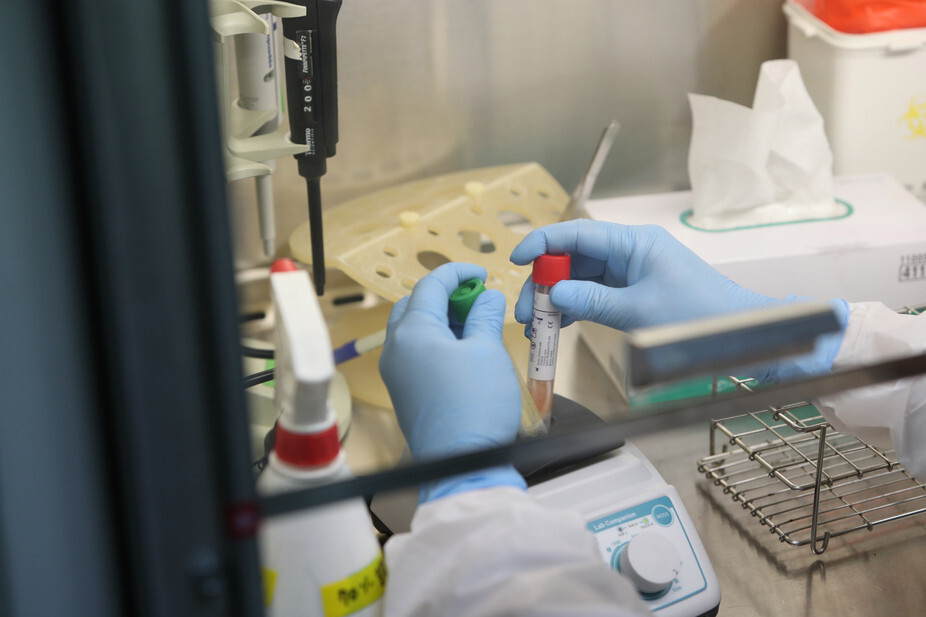hankyoreh
Links to other country sites 다른 나라 사이트 링크
[Fact check] Sorting through coronavirus misinformation

While the torrent of information on the novel coronavirus has led to a proliferation of news reports and online data on diagnostic methods, some distorted information is also making the rounds. Many are sounding the alarm over a so-called “infodemic” of falsehoods about virus testing and treatment methods. We talked to diagnostic physicians to examine some of the claims that are being spread in South Korea.
There’s a “10-minute diagnostic kit” that can’t be used in S. Korea because of excessive regulations?This is half-true. A diagnostic (antigen-antibody) kit that produces results in 10 to 20 minutes has not been approved by the government for use in South Korea. The coronavirus tests that have been developed to date include antigen-antibody and molecular diagnosis methods. Public health officials have approved a real-time gene amplification (RT-PCR) kit, which involves molecular diagnosis, but have not granted approval for the antigen-antibody kit. The diagnostic kits that have been approved in South Korea take three to six hours to produce test results. In contrast, developers of antigen-antibody kits claim that the testing time can be shortened to the range of 10-20 minutes, and that the kits could be used in South Korea.
The reason public health officials have not approved the antigen-antibody kits is because of the low level of accuracy. Diagnostic experts rate the accuracy level of such kits at around 50-70%, significantly less than the level of over 95% for real-time gene amplification. “The high likelihood of error in antigen-antibody diagnosis means they are not adequate for use in isolation and treatment at present,” said Lee Hyeok-min, a professor of diagnostic medicine at Yonsei University Severance Hospital.
It’s a mistake to perform testing with mixed coronavirus specimens?The Ministry of National Defense (MND) recently pursued a plan for simultaneous coronavirus testing on combined samples from four soldiers at a training site in the Daegu/North Gyeongsang Province area. Some news outlets reported that this could “result in inaccurate results due to sample contamination.”
But mixed testing -- the combination of different samples for diagnosis -- is not wrong. Jeon Chang-ho, a professor of diagnostic medicine at Daegu Catholic University Hospital, explained, “If you’re mixing samples from around four people, there’s zero likelihood that a sample that would test positive will come out negative.” According to a 2012 paper published in the US Journal of Clinical Microbiology, no major difference in accuracy was observed between individual testing and mixed testing using 10 samples. In a Mar. 24 briefing, Korea Centers for Disease Control and Prevention (KCDC) Vice Director Kwon Jun-wook said, “While [the approach] hasn’t been used by the KCDC so far, our diagnosis and testing team says they could perform testing for up to 32 people at the same time.”
The “45-minute coronavirus diagnosis” mentioned by Trump has low accuracy?On Mar. 21, the US Food and Drug Administration (FDA) approved a method that is capable of providing coronavirus test results in 45 minutes. The method was also publicly mentioned by US President Donald Trump. On the internet, some have been claiming that the testing approach has “low accuracy.”
But this argument appears to be based on confusion between the testing method and antigen-antibody diagnosis. GeneXpert, the system approved by the FDA, is a molecular diagnosis method. With an accuracy rate upwards of 90-95%, experts agreed that it is unlikely to be much different from the testing methods that have been approved in South Korea.
“It may be useful as a supplementary diagnostic approach for when we need to confirm coronavirus diagnoses quickly, as with emergency patients,” suggested Kwon Gye-cheol, president of the Korean Society for Laboratory medicine. Currently, 100 public health centers and hospitals in South Korea are reportedly to possess suitable equipment for the reagent.
By Park Jun-yong, staff reporter
Please direct comments or questions to [english@hani.co.kr]

Editorial・opinion
![[Editorial] Korea must respond firmly to Japan’s attempt to usurp Line [Editorial] Korea must respond firmly to Japan’s attempt to usurp Line](https://flexible.img.hani.co.kr/flexible/normal/500/300/imgdb/original/2024/0514/2317156736305813.jpg) [Editorial] Korea must respond firmly to Japan’s attempt to usurp Line
[Editorial] Korea must respond firmly to Japan’s attempt to usurp Line![[Editorial] Transfers of prosecutors investigating Korea’s first lady send chilling message [Editorial] Transfers of prosecutors investigating Korea’s first lady send chilling message](https://flexible.img.hani.co.kr/flexible/normal/500/300/imgdb/original/2024/0514/7917156741888668.jpg) [Editorial] Transfers of prosecutors investigating Korea’s first lady send chilling message
[Editorial] Transfers of prosecutors investigating Korea’s first lady send chilling message- [Column] Will Seoul’s ties with Moscow really recover on their own?
- [Column] Samsung’s ‘lost decade’ and Lee Jae-yong’s mismatched chopsticks
- [Correspondent’s column] The real reason the US is worried about Chinese ‘overcapacity’
- [Editorial] Yoon’s gesture at communication only highlights his reluctance to change
- [Editorial] Perilous stakes of Trump’s rhetoric around US troop pullout from Korea
- [Guest essay] Preventing Korean Peninsula from becoming front line of new cold war
- [Column] The state is back — but is it in business?
- [Column] Life on our Trisolaris
Most viewed articles
- 1[Editorial] Korea must respond firmly to Japan’s attempt to usurp Line
- 2Major personnel shuffle reassigns prosecutors leading investigations into Korea’s first lady
- 3[Column] Will Seoul’s ties with Moscow really recover on their own?
- 4[Editorial] Transfers of prosecutors investigating Korea’s first lady send chilling message
- 5US has always pulled troops from Korea unilaterally — is Yoon prepared for it to happen again?
- 6Exchange rate, oil prices, inflation: Can Korea overcome an economic triple whammy?
- 7[Editorial] Perilous stakes of Trump’s rhetoric around US troop pullout from Korea
- 8[Column] Samsung’s ‘lost decade’ and Lee Jae-yong’s mismatched chopsticks
- 9Korean opposition decries Line affair as price of Yoon’s ‘degrading’ diplomacy toward Japan
- 10Naver’s union calls for action from government over possible Japanese buyout of Line